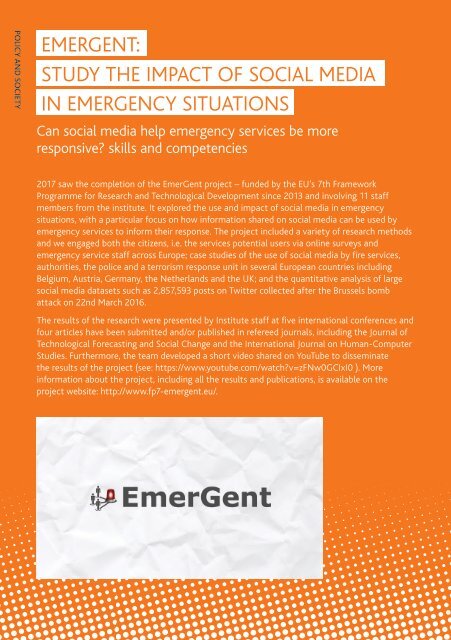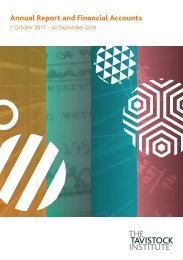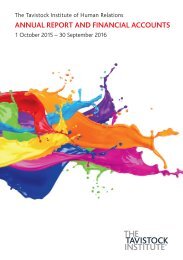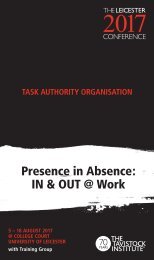Tavistock Institute of Human Relations Annual Report, 1st October 2016 - 30th September 2017.
This is the latest Tavistock Institute of Human Relations Annual Report! Covering from the 1st of October 2016, up to the 30th of September 2017.
This is the latest Tavistock Institute of Human Relations Annual Report! Covering from the 1st of October 2016, up to the 30th of September 2017.
You also want an ePaper? Increase the reach of your titles
YUMPU automatically turns print PDFs into web optimized ePapers that Google loves.
POLICY AND SOCIETY<br />
EMERGENT:<br />
STUDY THE IMPACT OF SOCIAL MEDIA<br />
IN EMERGENCY SITUATIONS<br />
Can social media help emergency services be more<br />
responsive? skills and competencies<br />
2017 saw the completion <strong>of</strong> the EmerGent project – funded by the EU’s 7th Framework<br />
Programme for Research and Technological Development since 2013 and involving 11 staff<br />
members from the institute. It explored the use and impact <strong>of</strong> social media in emergency<br />
situations, with a particular focus on how information shared on social media can be used by<br />
emergency services to inform their response. The project included a variety <strong>of</strong> research methods<br />
and we engaged both the citizens, i.e. the services potential users via online surveys and<br />
emergency service staff across Europe; case studies <strong>of</strong> the use <strong>of</strong> social media by fire services,<br />
authorities, the police and a terrorism response unit in several European countries including<br />
Belgium, Austria, Germany, the Netherlands and the UK; and the quantitative analysis <strong>of</strong> large<br />
social media datasets such as 2,857,593 posts on Twitter collected after the Brussels bomb<br />
attack on 22nd March <strong>2016</strong>.<br />
EUROPEAN TEXTILE AND CLOTHING<br />
BUSINESS LAB (TCBL)<br />
How can this sector become more socially sustainable<br />
and knowledge driven?<br />
TCBL is a pan European project, funded by Horizon 2020 (GA number 646133), which enables the<br />
TIHR to apply its complexity and systems thinking perspectives to supporting the transformation<br />
<strong>of</strong> the Textiles sector from one which is wasteful economically, socially and ecologically to<br />
one that sustainable and knowledge driven in all those there aspects. The last year focused on<br />
researching and writing up a set <strong>of</strong> case studies, explaining focus and early results <strong>of</strong> the six<br />
business cases developed by the project. These have been published in a handbook which can be<br />
accessed here: https://issuu.com/tcbl/docs/business_cases_evaluation_2017<br />
In addition, we have continued to elaborate our social network analysis <strong>of</strong> the TCBL ecosystem<br />
as well as run a workshop in London for partners, which aimed to develop a first iteration <strong>of</strong> the<br />
contribution story <strong>of</strong> the project.<br />
POLICY AND SOCIETY<br />
The results <strong>of</strong> the research were presented by <strong>Institute</strong> staff at five international conferences and<br />
four articles have been submitted and/or published in refereed journals, including the Journal <strong>of</strong><br />
Technological Forecasting and Social Change and the International Journal on <strong>Human</strong>-Computer<br />
Studies. Furthermore, the team developed a short video shared on YouTube to disseminate<br />
the results <strong>of</strong> the project (see: https://www.youtube.com/watch?v=zFNw0GCIxI0 ). More<br />
information about the project, including all the results and publications, is available on the<br />
project website: http://www.fp7-emergent.eu/.<br />
8 9














